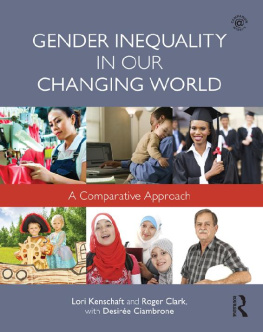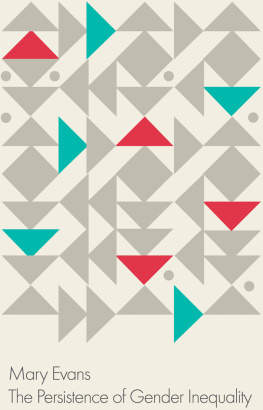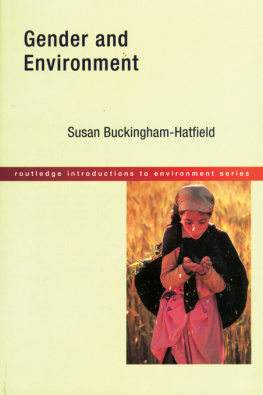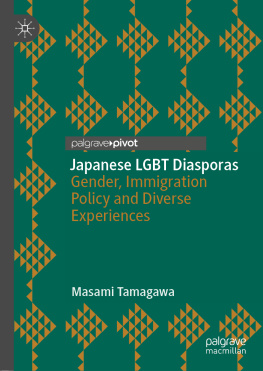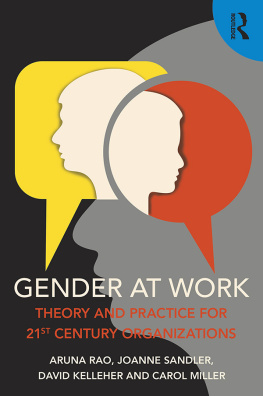Gender
Inequality
Socioeconomic Analysis and Developing Country Case Studies
Gender
Inequality
Socioeconomic Analysis and Developing Country Case Studies
Clement A. Tisdell
The University of Queensland, Australia
Published by
World Scientific Publishing Co. Pte. Ltd.
5 Toh Tuck Link, Singapore 596224
USA office: 27 Warren Street, Suite 401-402, Hackensack, NJ 07601
UK office: 57 Shelton Street, Covent Garden, London WC2H 9HE
Library of Congress Cataloging-in-Publication Data
Names: Tisdell, C. A. (Clement Allan), author.
Title: Gender inequality : socioeconomic analysis and developing country case studies / authored by Clement A. Tisdell.
Description: New Jersey : World Scientific Publishing Co. Pte. Ltd., [2019]
Identifiers: LCCN 2019005322 | ISBN 9789811200823
Subjects: LCSH: Sex discrimination against women--Cross-cultural studies. | Women--Social conditions--Cross-cultural studies. | Womens rights--Cross-cultural studies. | Equality--Cross-cultural studies.
Classification: LCC HQ1237 .T57 2019 | DDC 305.42--dc23
LC record available at https://lccn.loc.gov/2019005322
British Library Cataloguing-in-Publication Data
A catalogue record for this book is available from the British Library.
Copyright 2019 by World Scientific Publishing Co. Pte. Ltd.
All rights reserved. This book, or parts thereof, may not be reproduced in any form or by any means, electronic or mechanical, including photocopying, recording or any information storage and retrieval system now known or to be invented, without written permission from the publisher.
For photocopying of material in this volume, please pay a copying fee through the Copyright Clearance Center, Inc., 222 Rosewood Drive, Danvers, MA 01923, USA. In this case permission to photocopy is not required from the publisher.
For any available supplementary material, please visit https://www.worldscientific.com/worldscibooks/10.1142/11293#t=suppl
Desk Editor: Lum Pui Yee
Typeset by Stallion Press
Email:
Printed in Singapore
To Lucy, Chloe and Louis in the hope that their
world will be more caring than ours has been.
About the Author

Clement A Tisdell is Professor Emeritus, School of Economics, The University of Queensland, Brisbane, Australia, a Fellow of the Academy of Social Sciences in Australia and an Honorary Professor of Renmin (Peoples) University, China. He is one of the top ranked economists internationally according to IDEAS. He has been researching aspects of gender inequality and publishing in this area for more than 20 years. He has authored or edited numerous books. His most recent books include Economic and Environmental Change: The Challenges We Face, Sustaining Biodiversity and Ecosystem Functions: Economic Issues, Human Values and Biodiversity Conservation: The Survival of Wild Species, Competition, Diversity and Economic Performance, Handbook of Tourism Economics Analysis, New Application and Case Studies, Naturebased Tourism and Conservation New Economic Insights and Case Studies. His book Economics of Environmental Conservation, Second Edition was given the Choice Award of the American Libraries Association. The demands for his books have been such that most have been reissued in recent times and kept in print. In addition, he has published over 600 articles in international journals. His full biographical details can be found by visiting the following website: https://economics.uq.edu.au/profile/2153/clement-tisdell and he can be found on LinkedIn https://www.linkedin.com/in/clement-tisdell-0a492b2b/ Also see his profile on ResearchGate https://www.research-gate.net/profile/Clement_Tisdell and Academia.
Tisdell has held visiting positions in many universities (e.g. Princeton and Stanford) and other institutions in nations which include Brunei, China, Germany, Fiji, France, India, Japan, New Zealand, Sweden, Switzerland, UK and USA. He has undertaken much primary (grassroots) research in the Asia-Pacific including India and China. His wide research interests extend well beyond economics. His research output has a high impact on other researchers (see ResearchGate, for example). His basic aim is to know the fundamental nature of things and to do so, he typically combines theory and empiricism. This he does in Gender Inequality.
Preface
I have been concerned for many years about the welfare of socially disadvantaged groups and individuals. This is reflected in the significant amount of research which I have completed on this subject over several decades. Much of this research has focused on the disabilities faced by females, particularly in developing countries. I was, therefore, delighted when Lum Pui Yee of World Scientific Publishers encouraged me to submit a proposal for an authored book on the subject of gender inequality. This gave me an opportunity to integrate my ideas about gender inequality and undertake additional research into its prevalence, causes, consequences and possible remedial actions.
I am convinced that issues involving gender inequality must be considered and analyzed in a multidisciplinary manner, and I have tried to do that in this book. Therefore, in this book, I take into account both economic and sociological (cultural) factors that are liable to influence the existence, nature and extent of gender inequality. It is also realized that other factors can have an influence on gender inequality, such as biological differences between males and females.
Given the contracted length of this book, I have had to be selective in deciding on the material to include in it. It has not been possible to give much attention to gender-related studies in which I have been involved in in Pakistan and Vietnam. Furthermore, limited reference has been made to joint gender studies in sub-Saharan Africa, in which I have taken part and some of my research about gender inequality in the Pacific Islands. As well, only a part of my gender-related research output for India and Bangladesh has been covered. To have included coverage of all of these items would have made this book too unwieldly. In any case, I believe that the contents of this book strike an appropriate balance between analysis (theory), case studies and illustrative examples.
I wish to acknowledge those individuals who have supported my research efforts in various ways. They include Dr. Kartik Roy, the late Professor Raj Kumar Sen, Professor Tabitha Kiriti Nganga, Professor Mohammad A. Hossain, Associate Professor Hong Liu, Dr. Julie J. Wen, Associate Professor Agha Nadia, Dr. Shabbir Ahmad, Ananda Ghose, Somnath Hazra and Gopal Regmi. In addition, the following persons provided valuable support for fieldwork in India: Professor G. C. Kar, Dr. P. K. Acharya, Mrs. Nanda Arati and Susanta Roy. I am also grateful to all those villagers and others in India who were willing to give their time to respond to my questionnaires and who were prepared to discuss gender issues with me.


